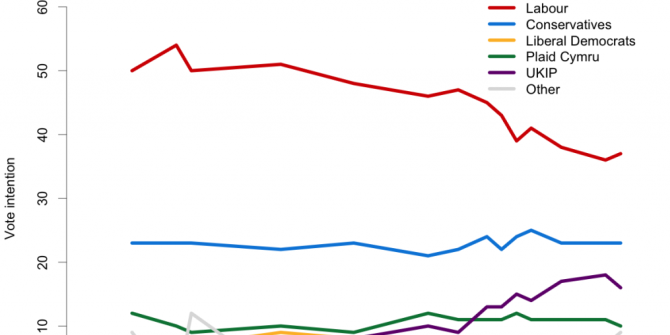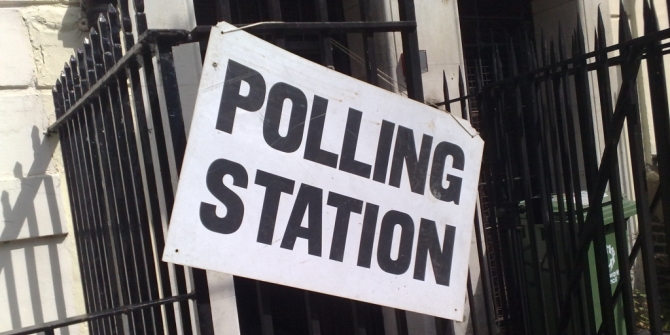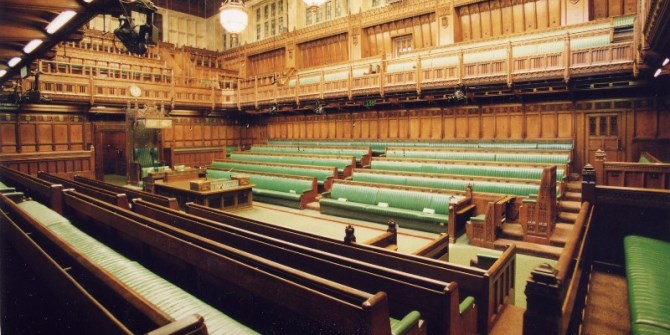Despite the Labour Party’s historic strength in Wales, in this post Roger Scully highlights the remarkable decline in support for the party in polls over the past two years. He argues that Labour’s gradual descent is thanks to a combination of factors: from Ed Miliband’s (un)popularity, to negative perceptions of the performance of the Welsh Labour government.
For the Labour party to become the largest party in the Commons after the general election in May, they need a net swing of 25 seats from the Conservatives. To win a parliamentary majority they require a net gain of 68 seats on the result of the 2010 general election. To achieve the former goal, and certainly to have a chance of the latter one, Labour will need to make ground in Wales. Cardiff North, the 14th most marginal seat across the UK, is a must-win for Labour to have serious hopes of finishing ahead of the Tories. To reach a majority Labour would need to count on picking up a number of other seats that they lost in 2010 but won under Tony Blair.
Labour has long been able to count on Wales. Labour first attracted the highest share of the vote in Wales in 1922. It has done so at every general election since, and secured an absolute majority of Welsh seats every single time from 1935 onwards. Even in otherwise disastrous polls like the ‘National Government’ election of 1931, Wales remained staunch for Labour. And since 1945, ‘normal’ politics in the Welsh context has meant utter Labour domination. Even in the Welsh Assembly, elected since 1999 under a semi-proportional version of AMS, Labour have always won the most votes and seats, and have always been in government.
For a few years up to 2010 this hegemony appeared under threat. In the 2007 devolved elections, Labour’s vote share fell more in Wales than in Scotland – despite Welsh Labour facing no opponent remotely as strong as the SNP. A year later Welsh Labour suffered big losses in local elections, and in 2009 they actually finished behind the Conservatives in Wales in the European elections. The 2010 general election saw Labour’s vote share in Wales fall to 36.2% – almost 20% below the mark achieved in 1997, and worse even than the vote won in the desperate defeat of 1983. Indeed, for anoraks 2010 was notable as being the first occasion since World War I when Labour in Wales had won a lower vote share in a devolved or parliamentary election than in Scotland. In both 2007 and 2010, Labour managed to avoid substantial seat losses. But this partly reflected sheer luck (just holding on in several constituencies) and partly the absence of a single strong challenger. Labour’s Welsh citadel had not fallen yet, but the ramparts were visibly trembling.
Yet almost from the moment the ink dried on the coalition agreement in London, Welsh Labour was resurgent. No longer tarnished by association with an unpopular UK government, the party’s popularity recovered rapidly. In stark contrast to Scotland, the May 2011 devolved elections in Wales saw Labour achieve its best-ever result. The following year’s local elections witnessed Labour make over 230 net gains, and sweep back into power across much of Wales. In the four Welsh opinion polls reported in 2012, Labour’s general election vote share was at 50% or above in every one. When the Welsh Political Barometer (a collaboration between ITV-Wales, Cardiff University and YouGov, to provide more regular Welsh polling) was launched in December 2013, Labour’s poll rating put it on course to make seven net seat gains for Westminster, and to win three of Wales’ four MEPs in the May 2014 European elections.
What has happened since has been perhaps the biggest polling movement in recent UK history that almost no-one has heard of. As the graph below indicates, Labour have lost a third of their support in the Welsh polls in the last two years. In the most recent Barometer poll (published on 27th January) Labour is at 37%, barely above its 2010 vote share. This is no outlier, by the way – all of the last six published polls have put Labour below 40% in Wales. Nor have Labour’s problems been confined to the polls: the party ended up winning only one of the four Welsh seats in the European elections, barely finishing ahead of UKIP in vote share.
Labour’s decline has not been sudden. That is probably why it has attracted limited attention: there has been no single dramatic poll showing Labour support levels crashing through the floor, but rather a slow ebbing of support over an extended period of time.
Why has this happened? There has been no major, seismic event like Scottish referendum to fundamentally change attitudes to politics and parties in Wales. What we can say is that it is clearly not just about Ed Miliband. His popularity ratings in Wales are unimpressive; he might, indeed, be regarded as almost the perfect Labour leader to be unappealing to much of its traditional working-class support in Wales. But the problems go much deeper. Labour’s support levels for Welsh devolved elections have also fallen substantially, and the Labour Welsh Government’s performance is not highly rated – even by Labour supporters. Welsh Labour’s management of the NHS has even attracted unfavourable attention within the broader UK political debate. Meanwhile, UKIP has been attracting growing support in seats that Labour have consistently won for decades – and where the Labour party machinery are therefore not geared up to facing serious opposition.
What does this mean for the election? Labour is now approaching the campaign with significantly lowered expectations. A year ago, Wales could have been expected to provide more than its share of Labour seat gains: if Ed Miliband was to fall short of a majority, it would not be the fault of the Welsh party. Now things look much less promising. On the latest poll Labour are projected to gain only two seats (Cardiff North and Cardiff Central). There remains no strong single challenger to Labour in Wales – unlike their Scottish counterparts, Welsh Labour have been, and thus far largely remain, lucky in their opponents. But they may not go on being lucky for ever.
This article was originally published on our sister site, the LSE’s General Election blog.
 Roger Scully is Professor of Political Science at Cardiff University
Roger Scully is Professor of Political Science at Cardiff University









After a life time in Labour I’m sick and tired of the excises and the never ending rubbish you get, I have needed a dentist for myself and my grandsons and I have written spoke to and phoned people .
All I get is phone this number of this number or speak to this or contact this one it’s never ending, then when you demand they say to you sorry cannot help.
Labour time in power needs to come to an end so that people can dam well get actions not just excuses.
Labour has to lose to get the action the people need.
Looking at those numbers, Brecon and Radnor should make up for Cardiff North for the Conservatives as well, effectively halving Labour’s gains.